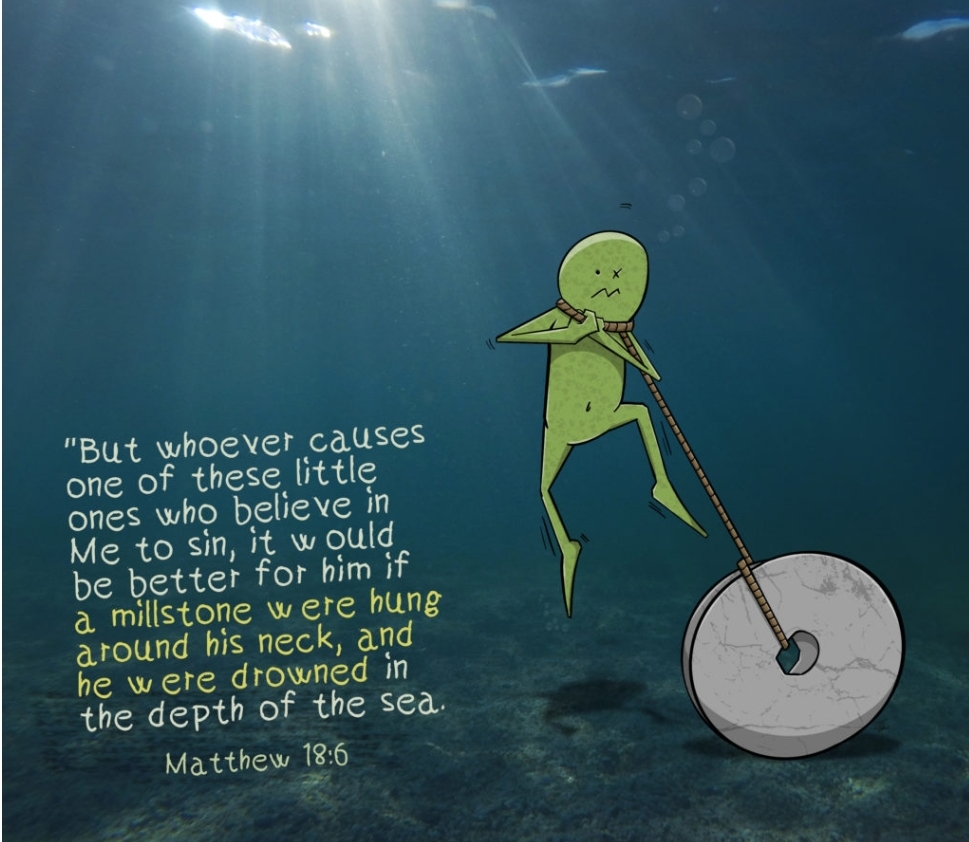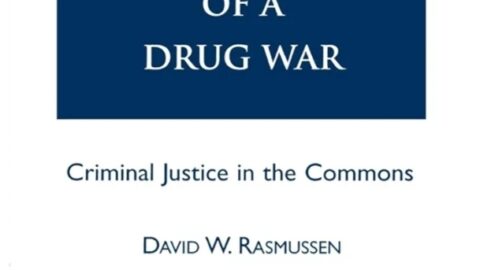Matthew 18:6 (KJV)
“But whoso shall offend one of these little ones which believe in me, it were better for him that a millstone were hanged about his neck, and that he were drowned in the depth of the sea.”
This verse carries a profound warning from Jesus Christ about the severe consequences of leading or causing harm to those who are vulnerable, particularly children or young believers in faith. Let’s break this down in detail:
What Does “Offend” Mean in This Context?
In the original Greek text, the word translated as “offend” is “skandalizó” (σκανδαλίζω). This word carries deeper meanings than our modern understanding of “offend” as merely hurting someone’s feelings. It primarily means:
- To cause to stumble or fall into sin
- To lead astray or become a stumbling block
- To create doubt or weaken faith
- To entrap or ensnare someone spiritually, morally, or emotionally
In this context, “offend” refers to any action, behavior, or system that causes a “little one”—a child or someone young in faith—to lose trust in God, fall into sin, or experience spiritual harm.
Generational Dysfunctions Are Included
Generational dysfunctions fall under this warning. When emotional, physical, psychological, or spiritual harm is passed down through generations, it can create barriers to faith and trust in God.
A. Emotional Dysfunction
- Emotional neglect or abuse can cause deep-rooted insecurity, fear, and self-worth issues.
- These wounds often prevent individuals from experiencing God’s love or trusting others fully.
B. Physical Dysfunction
- Physical abuse or neglect can damage one’s view of authority, making it hard to see God as a loving Father.
- It can create patterns of violence or self-destructive behavior.
C. Psychological Dysfunction
- Mental manipulation, gaslighting, or emotional abuse can distort one’s perception of truth and reality.
- It can cause lifelong struggles with trust, anxiety, or self-esteem.
D. Spiritual Dysfunction
- Hypocrisy, legalism, or spiritual abuse (e.g., misusing scripture for control) can turn someone away from God.
- A misrepresentation of God’s character can result in rebellion or apathy toward faith.
When these dysfunctions are passed down generationally—whether through harmful behaviors, unhealthy mindsets, or toxic environments—they create stumbling blocks. If a parent, leader, or role model is the cause, they bear responsibility for “offending” those in their care.
In Summary:
To “offend” in this context means to cause spiritual, emotional, physical, or psychological harm that results in someone stumbling in their faith, losing trust, or being led away from God. Generational dysfunctions certainly align with this interpretation, as they perpetuate cycles of harm that affect individuals’ relationships with themselves, others, and God.
What Is a Millstone?
A millstone is a large, heavy stone used in ancient grain mills to grind grain into flour. These stones were massive, often weighing hundreds of pounds, and were typically powered by animals or water-driven mechanisms.
Symbolism of the Millstone in Matthew 18:6:
- Weight and Finality: Having a millstone tied around one’s neck would guarantee drowning, symbolizing a permanent consequence for those who harm “little ones.”
- Severity of Judgment: The imagery emphasizes how serious it is to lead vulnerable individuals astray or cause them harm.
- Inescapable Outcome: The weight of a millstone would ensure no escape from drowning, symbolizing the inescapable consequences of spiritual offenses.
The use of this imagery by Jesus serves as a strong and unmistakable warning. He is essentially saying: It would be better to suffer an irreversible physical fate than to face the eternal consequences of harming the faith of a child or vulnerable believer.
Deeper Reflection on the Passage
A. The Value of “Little Ones” to God
- Children and young believers are precious in God’s sight.
- Their vulnerability requires protection, nurturing, and guidance rather than exploitation, harm, or neglect.
B. Responsibility and Accountability
- Adults, especially parents, teachers, leaders, or anyone in a position of authority, are accountable for their influence on the vulnerable.
- Neglect, abuse, hypocrisy, or dysfunction that leads a child astray carries severe spiritual consequences.
C. Generational Responsibility
- Parents and leaders have the duty to break cycles of generational dysfunction rather than perpetuate them.
- Healing generational wounds requires awareness, intentional change, and reliance on God’s grace.
Application Today
A. In Parenting and Leadership:
- Avoid being a stumbling block to children and young believers.
- Foster an environment of love, truth, and security.
- Address generational dysfunctions and actively seek healing.
B. In Emotional and Spiritual Care:
- Be mindful of the long-term effects of words, actions, and behaviors.
- Model humility, forgiveness, and faith.
C. In Breaking Generational Curses:
- Recognize harmful patterns.
- Seek counseling, spiritual healing, and restoration.
- Teach children and young believers about God’s love, grace, and truth.
Conclusion
In Matthew 18:6, the term “offend” refers to causing someone to stumble in faith, leading them away from God, or creating barriers to their spiritual growth. Generational dysfunctions—whether emotional, physical, psychological, or spiritual—can indeed fall under this definition if they result in harm to faith or well-being.
The millstone serves as a symbol of the weighty consequences of such actions. It is a stark reminder of how seriously God views the harm caused to vulnerable individuals, whether intentional or through neglect.
This passage challenges us to examine our lives, our actions, and our influence on others, particularly those who are young, innocent, or new in their faith. It calls us to break cycles of dysfunction, nurture faith, and safeguard the vulnerable, ensuring that we are not contributing to stumbling blocks but rather building stepping stones toward a deeper relationship with God.






